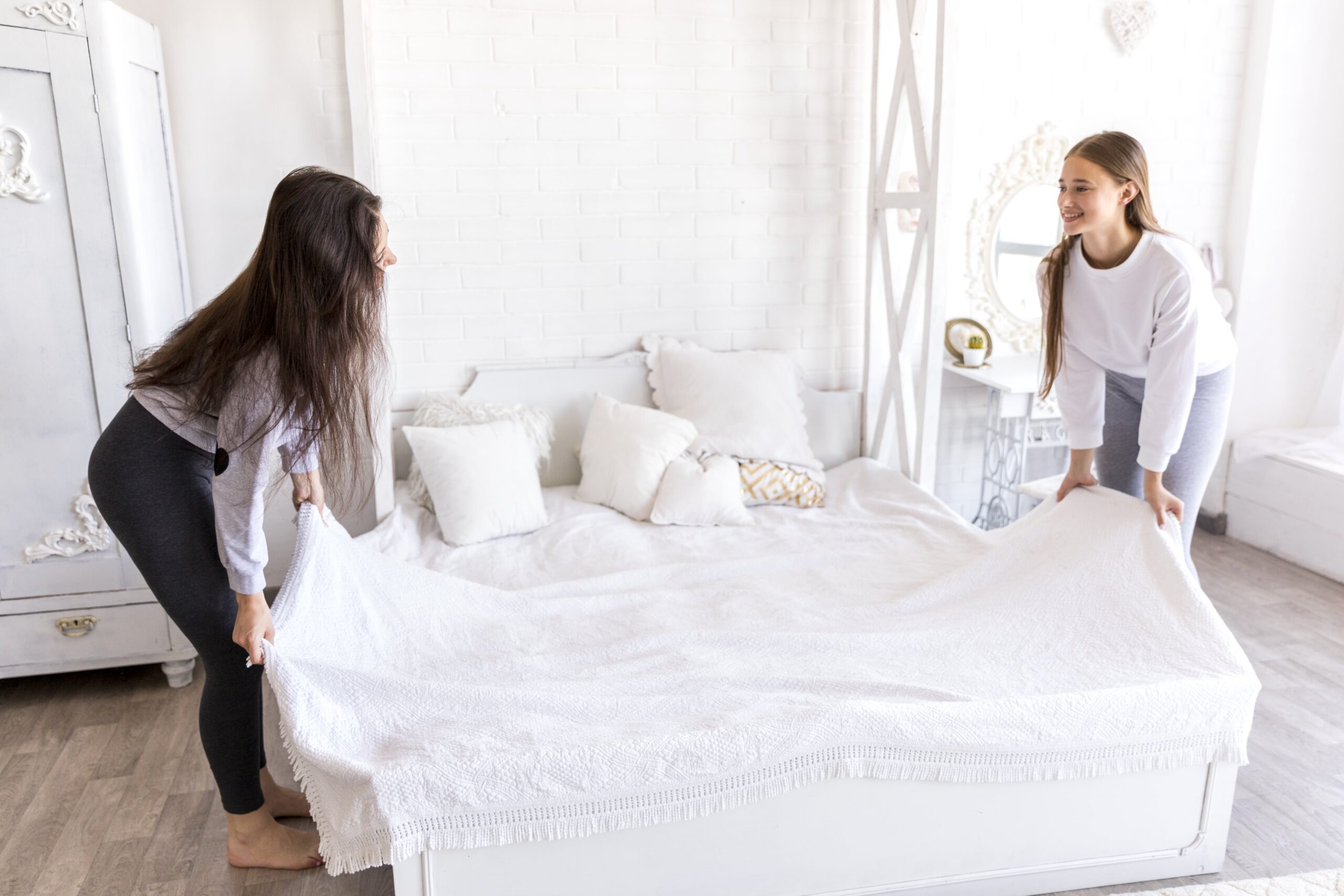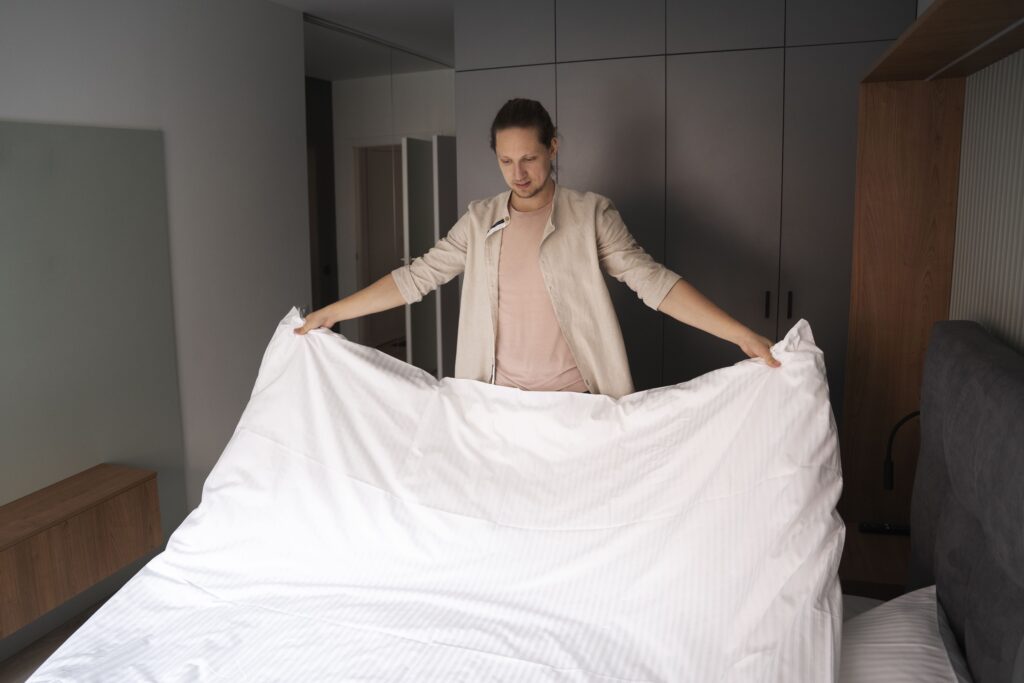A comprehensive guide on the best materials for duvet covers

Discover the perfect duvet cover material for your ultimate comfort and style. Our comprehensive guide explores cotton, linen, microfiber, silk, flannel, bamboo, and more. Make an informed choice for a cozy night’s sleep.
Understanding best materials for Duvet Covers

Definition of Duvet Covers
A duvet cover is a protective fabric case designed to encase and safeguard a duvet, which is a soft, fluffy blanket filled with materials like down, feathers, or synthetic fibers. Duvet covers serve as a removable outer layer that encloses the duvet, akin to a pillowcase for a pillow.
The Role of Duvet Covers in Bedding
Duvet covers shield the duvet from stains, dust, and wear, extending its lifespan. They offer the flexibility to change the look and style of your bedding easily. Duvet covers are washable, ensuring a clean and healthy sleeping environment.
Factors to Consider
Comfort and Texture
One of the foremost factors to ponder is the level of comfort you desire. Different materials offer distinct textures, ranging from silky smooth to crisp and cool. Assess how the material feels against your skin to ensure it aligns with your comfort preferences. For instance, cotton provides a soft, breathable option, while satin exudes a luxurious, silky touch.
Durability
Duvet covers are meant to withstand regular use and washing, so durability is a critical consideration. Investigate the strength of the material and its resistance to wear and tear. Look for sturdy weaves and high-quality construction to ensure your duvet cover lasts for years without showing signs of deterioration.
Maintenance and Care
Ease of maintenance plays a pivotal role in the longevity and practicality of your duvet cover. Consider whether the material requires special care, such as dry cleaning, or if it can be conveniently machine-washed at home. Knowing the care instructions in advance helps you make an informed choice that suits your lifestyle.
Style and Aesthetics
Your duvet cover material contributes significantly to the overall aesthetics of your bedroom. Reflect on the style you wish to achieve and choose a material that aligns with your vision. For a classic and timeless look, cotton or linen might be the ideal choice, while silk or satin can introduce an opulent and elegant atmosphere.
Budget
Budget considerations are pivotal in any decision-making process. Fortunately, there are many different duvet cover fabrics available at different price ranges, so you may select one that fits your budget. Consider your financial resources in relation to your goal for quality and elegance, and look into materials that offer the highest return on your investment.
Different Duvet Cover Materials
Cotton
Cotton duvet covers are celebrated for their breathability and softness. They are easy to care for and come in a wide range of styles. Cotton is a timeless choice that suits a variety of preferences.
Linen
Linen duvet covers exude a rustic and relaxed charm. They’re highly breathable, moisture-wicking, and become softer with each wash. Linen’s slightly wrinkled appearance adds to its casual elegance.
Silk
Silk duvet covers epitomize luxury and opulence. They are exceptionally smooth and hypoallergenic, making them a top choice for those with sensitivities. However, they require delicate care.
Microfiber
Microfiber duvet covers are known for their affordability and durability. They resist wrinkles and are easy to maintain, making them a practical choice for busy households.
Flannel
Flannel duvet covers provide warmth and coziness, making them perfect for cold climates or chilly nights. They effectively trap heat due to their soft, brushed surface.
Satin
Satin duvet covers boast a silky, shiny surface that exudes elegance. They are often favored for their luxurious appearance and smooth feel against the skin.
Sateen
Sateen duvet covers are similar to satin but are typically made from cotton. They have a lustrous finish, offering a balance between softness and sheen.
Tencel
Tencel duvet covers are environmentally friendly and prized for their silky softness. They are moisture-wicking and regulate temperature effectively, providing comfort year-round.
Bamboo
Bamboo duvet coverings are hypoallergenic and environmentally friendly. Being incredibly breathable and having a smooth, silky feel, they are a great option for overheated sleepers.
Polyester
Polyester duvet covers are affordable and durable. While they may lack the natural feel of other materials, they offer easy care and a wide range of design options.
Each of these duvet cover materials comes with its own set of characteristics, catering to different preferences and needs. Consider these qualities when making your selection to ensure that your duvet cover aligns with your desired comfort, style, and maintenance requirements.
VI. Best Materials for Specific Needs
For Hot Sleepers: Tencel
Tencel duvet covers are a fantastic choice for those who tend to sleep hot. This material excels in moisture-wicking and breathability, ensuring a cool and comfortable night’s rest. Its silky softness adds to the overall sleep experience.
For Allergies: Silk
Silk duvet covers are a top pick for individuals with allergies. Silk’s hypoallergenic properties naturally repel dust mites and allergens. Additionally, silk is exceptionally smooth against the skin, reducing the risk of irritation.
For Sustainable Options: Bamboo
Bamboo duvet covers are an eco-conscious choice. Bamboo is a renewable resource, and its production is environmentally friendly. These covers are also naturally hypoallergenic and offer a soft, silky texture for added comfort.
For Luxury and Aesthetics: Silk or Satin
When luxury and aesthetics are paramount, silk or satin duvet covers stand out. Both materials offer a sumptuous, silky finish that adds a touch of opulence to your bedroom. While silk is more delicate and requires careful maintenance, satin offers a similar sheen with the durability of cotton.
Conclusion:
In the quest for the perfect duvet cover material, we’ve delved into key factors like comfort, durability, and style while exploring materials such as cotton, linen, silk, and more. Tailoring your choice to specific needs, like temperature control or allergies, ensures a cozy and personalized bedroom retreat. By selecting the right duvet cover material, you’ll transform your bed into a haven that harmonizes comfort, aesthetics, and functionality for a restful night’s sleep.


